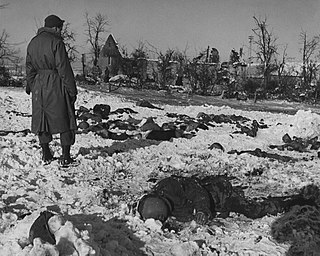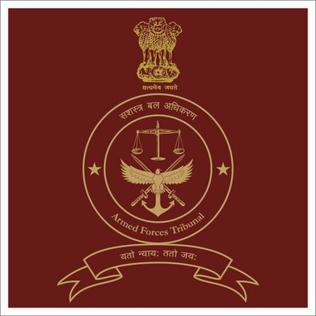 | |
| Parliament of India | |
|---|---|
| Enacted by | Parliament of India |
| Related legislation | |
| |
| Status: In force | |
The Armed Forces Tribunal Act, 2007 was passed by the Parliament and led to the formation of Armed Forces Tribunal in India. [1]
 | |
| Parliament of India | |
|---|---|
| Enacted by | Parliament of India |
| Related legislation | |
| |
| Status: In force | |
The Armed Forces Tribunal Act, 2007 was passed by the Parliament and led to the formation of Armed Forces Tribunal in India. [1]

A war crime is a violation of the laws of war that gives rise to individual criminal responsibility for actions by combatants in action, such as intentionally killing civilians or intentionally killing prisoners of war, torture, taking hostages, unnecessarily destroying civilian property, deception by perfidy, wartime sexual violence, pillaging, and for any individual that is part of the command structure who orders any attempt to committing mass killings including genocide or ethnic cleansing, the granting of no quarter despite surrender, the conscription of children in the military and flouting the legal distinctions of proportionality and military necessity.
The government of Poland takes the form of a unitary parliamentary representative democratic republic, whereby the president is the head of state and the prime minister is the head of government. However, its form of government has also been identified as semi-presidential.

An unlawful combatant, illegal combatant or unprivileged combatant/belligerent is a person who directly engages in armed conflict in violation of the laws of war and therefore is claimed not to be protected by the Geneva Conventions. The International Committee of the Red Cross points out that the terms "unlawful combatant", "illegal combatant" or "unprivileged combatant/belligerent" are not defined in any international agreements. While the concept of an unlawful combatant is included in the Third Geneva Convention, the phrase itself does not appear in the document. Article 4 of the Third Geneva Convention does describe categories under which a person may be entitled to prisoner of war status. There are other international treaties that deny lawful combatant status for mercenaries and children.
The Army of Republika Srpska, commonly referred to in English as the Bosnian Serb Army, was the military of Republika Srpska, the self-proclaimed Serb secessionist republic, a territory within the newly independent Bosnia and Herzegovina, which it defied and fought against. Active during the Bosnian War from 1992 to 1995, it continued to exist as the armed forces of RS, one of two entities making up Bosnia and Herzegovina, until 2006 when it was integrated into the Armed Forces of Bosnia and Herzegovina. Forces of the VRS engaged in several campaigns, including Operation Corridor 92, Operation Vrbas '92, Operation Bura, and Operation Spider; they were also involved in the siege of Sarajevo, as well as the Srebrenica massacre.

The Garda Síochána is the national police and security service of Ireland. It is more commonly referred to as the Gardaí or "the Guards". The service is headed by the Garda Commissioner, who is appointed by the Irish Government. Its headquarters are in Dublin's Phoenix Park.

A tribunal, generally, is any person or institution with authority to judge, adjudicate on, or determine claims or disputes—whether or not it is called a tribunal in its title. For example, an advocate who appears before a court with a single judge could describe that judge as "their tribunal". Many governmental bodies are titled "tribunals" to emphasize that they are not courts of normal jurisdiction. For instance, the International Criminal Tribunal for Rwanda was a body specially constituted under international law; in Great Britain, employment tribunals are bodies set up to hear specific employment disputes.
Enemy combatant is a term for a person who, either lawfully or unlawfully, engages in hostilities for the other side in an armed conflict, used by the U.S. government and media during the War on Terror. Usually enemy combatants are members of the armed forces of the state with which another state is at war. In the case of a civil war or an insurrection "state" may be replaced by the more general term "party to the conflict".
Ex parte Quirin, 317 U.S. 1 (1942), was a case of the United States Supreme Court that during World War II upheld the jurisdiction of a United States military tribunal over the trial of eight German saboteurs, in the United States. Quirin has been cited as a precedent for the trial by military commission of unlawful combatants.
In the context of war, perfidy is a form of deception in which one side promises to act in good faith with the intention of breaking that promise once the unsuspecting enemy is exposed.

In the practice of international law, command responsibility is the legal doctrine of hierarchical accountability for war crimes, whereby a commanding officer (military) and a superior officer (civil) is legally responsible for the war crimes and the crimes against humanity committed by his subordinates; thus, a commanding officer always is accountable for the acts of commission and the acts of omission of his soldiers.
Abdullah Mujahid is a citizen of Afghanistan who is still held in extrajudicial detention after being transferred from United States Guantanamo Bay detainment camps, in Cuba — to an Afghan prison. His Guantanamo Internment Serial Number was 1100.

The Military Commissions Act of 2006, also known as HR-6166, was an Act of Congress signed by President George W. Bush on October 17, 2006. The Act's stated purpose was "to authorize trial by military commission for violations of the law of war, and for other purposes".
Title 50 of the United States Code outlines the role of War and National Defense in the United States Code.
Major Navdeep Singh is an author, lawyer and a former reservist-vounteer of the Indian Territorial Army.

In the United Kingdom, military conscription has existed for two periods in modern times. The first was from 1916 to 1920, and the second from 1939 to 1960. The last conscription term ended in 1963 although many soldiers chose to continue in the service beyond 1963.

The Geneva Conventions are international humanitarian laws consisting of four treaties and three additional protocols that establish international legal standards for humanitarian treatment in war. The singular term Geneva Convention colloquially denotes the agreements of 1949, negotiated in the aftermath of the Second World War (1939–1945), which updated the terms of the two 1929 treaties and added two new conventions. The Geneva Conventions extensively define the basic rights of wartime prisoners, civilians and military personnel; establish protections for the wounded and sick; and provide protections for the civilians in and around a war-zone.

The Upper Tribunal is a superior court of record and general tribunal in the United Kingdom.

The Armed Forces Act 2004 is an Act of the Parliament of the United Kingdom.

Armed Forces Tribunal is a military tribunal in India, established under the Armed Forces Tribunal Act, 2007.
Tribunals in India are quasi-judicial bodies for settling various administrative and tax-related disputes, including matters that are under the jurisdiction of Central Administrative Tribunal (CAT), Income Tax Appellate Tribunal (ITAT), Customs, Excise and Service Tax Appellate Tribunal (CESTAT), National Green Tribunal (NGT), Competition Appellate Tribunal (COMPAT) and Securities Appellate Tribunal (SAT), among others.